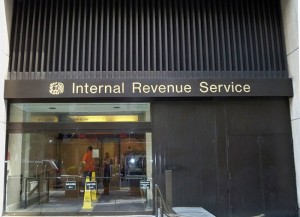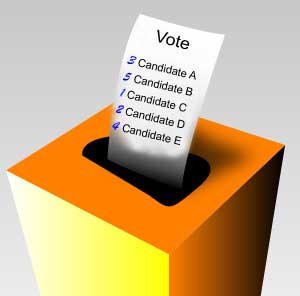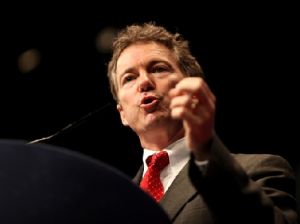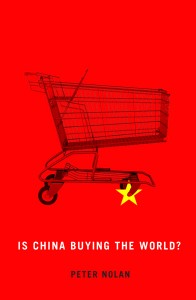Another Federal Scandal?
May 22nd, 2013 // 3:59 pm @ Oliver DeMille
 The Obama trifecta of scandals including Benghazi, IRS targeting, and AP phone records is now joined by another potential scandal.
The Obama trifecta of scandals including Benghazi, IRS targeting, and AP phone records is now joined by another potential scandal.
The EPA is accused of ongoing “Sue and Settle” practices, which means that they work with left-leaning environmental groups who file suits against a federal agency and then the attorneys work out settlements that are beneficial to both sides.[i]
All of this, it is alleged, is based on “a prearranged settlement agreement they craft together behind closed doors …. While the environmental group is given a seat at the table, outsiders who are most impacted are excluded, with no opportunity to object to the settlements.”[ii]
And taxpayers foot the bill for millions of dollars in costs.
As the scandals become a mainstream topic of media coverage, other agencies may face further scrutiny.
And as government gets bigger and bigger, the executive branch and its many agencies are less and less accountable.
When government is too big, the number of scandals will predictably increase.
Whether or not the EPA issue becomes a point of mainstream discussion, this new era of scandal has rekindled the question of trust in government.
Historically, governments and officials who truly have nothing to hide urge the citizenry to be generally mistrustful of government.
For example, the American founding generation felt that such mistrust of state and federal institutions was a hallmark of a wise and free people.[iii]
Indeed, the entire Constitutional framework is based on the fundamental assumption that those in power must be mistrusted and closely watched.[iv]
In more recent eras, governments have consistently called for people to give great trust to the government, even as agencies have become less transparent, more secretive, and less trustful of the people.
In short, there is a real trust deficit in our society—but it isn’t what officials and the media usually suggest.
The real problem is that government is lest trustful of its citizens, and the people are less likely than past generations to keep a close eye on potential government abuses.
The natural result is a steady decline in freedom.
This may have sounded alarmist a month ago, but in the wake of current scandals it is mild compared to what many pundits are saying.
How many more federal scandals are waiting in the wings?
More importantly, at what point will enough citizens finally stand up and begin to lead again?
Freedom only lasts when the people are closely involved in overseeing government and serving as the final arbiters of government power.[v]
Until the people refocus on this role, America’s current decline will inevitably continue.
[i] Larry Bell, “EPA’s Secret and Costly ‘Sue and Settle’ Collusion With Environmental Organizations,” Forbes.com, February 17, 2013.
[ii] Ibid.
[iii] See Federalist 48-51.
[iv] Federalist 48.
[v] Federalist 46. See also, John Locke, Second Essay Concerning Civil Government, and the 1776 Virginia Declaration of Rights.
***********************************
 Oliver DeMille is the chairman of the Center for Social Leadership and co-creator of Thomas Jefferson Education.
Oliver DeMille is the chairman of the Center for Social Leadership and co-creator of Thomas Jefferson Education.
He is the author of A Thomas Jefferson Education: Teaching a Generation of Leaders for the 21st Century, and The Coming Aristocracy: Education & the Future of Freedom.
Oliver is dedicated to promoting freedom through leadership education. He and his wife Rachel are raising their eight children in Cedar City, Utah.
Category : Blog &Citizenship &Current Events &Featured &Government &Leadership &Politics
The Silver Lining in The Scandals
May 21st, 2013 // 4:42 pm @ Oliver DeMille
 It’s starting to seem like it was the Obama Administration that made the following saying famous: “A crisis is a terrible thing to waste.”
It’s starting to seem like it was the Obama Administration that made the following saying famous: “A crisis is a terrible thing to waste.”
The idea behind this quip was that when a big crisis came, the White House should use it to push its big-government agenda.
In an ironic twist, the current triple scandals (IRS, Benghazi, and Associated Press) are accomplishing exactly the opposite.
The White House and indeed most of the executive branch is spending a great deal of its energy right now dealing with the scandals.
The result is that less money, time and effort are being spent on spreading big government.
At the same time, more Americans are paying attention to what is happening in Washington.
The word “scandal” seems to create more interest in what is happening than business as usual.
The more citizens who pay close attention to what the government does, the better for freedom.
In short, we’re experiencing at least two positive side effects of the current scandals:
- The executive branch is doing less, because it is focused on responding to the scandals
- More regular citizens are watching their government.
It’s sad that it takes scandal to accomplish such things, but at least they are happening.
Perhaps the most amazing thing in all this has been the Administration’s continued trust in government agencies.
After all the press and firings in the aftermath of government officials enjoying taxpayer-funded trips to Jacuzzis in Hawaii, you’d think the White House would be carefully watching its agencies and officials.
But even though it has asked for resignations from various agency officials, the Administration has emphasized that lone people and/or “isolated” bureaus made mistakes and held fast to the idea that government should be trusted.
At the same time, the Administration continues to express major distrust for businesses and pretty much anyone outside of government.
Why the double standard?
The various press briefings from the Administration emphasize a sense of, “Just trust us; after all, we’re the government. Of course we are telling the truth and doing the right thing.”
This flies in the face of the Framers’ view of government.
The American system and Constitution were founded on the idea that government is dangerous and that freedom can only last if the people mistrust the government and keep a close eye on it in order to keep it in line.
As Jefferson put it: “Let no more be said of confidence in man, but bind him down from mischief by the chains of the Constitution.”
In Jefferson’s world, the assumption was that government officials should be generally suspected of being involved in “mischief.”
A healthy mistrust of government was a central point to maintaining freedom.
George Washington said: “Government is not reason, it is not eloquence—it is force! Like a fire, it is a dangerous servant and a fearful master.”
Madison added that government is the most dangerous threat to freedom: “I believe there are more instances of the abridgement of freedom of the people by gradual and silent encroachments of those in power, than by violent and sudden usurpations…”
For Madison, the great danger to freedom was government increasing its power over the people in “gradual and silent” ways.
Government has done this for a long time, and under the leadership of both parties at different times.
When it gets caught, it’s a scandal.
Just as the Johnson Administration is known for Vietnam and the Nixon era for Watergate, many other presidencies are known for their crises: Reagan for Iran-Contra, Bush I for higher taxes after promising it wouldn’t happen, Clinton for the Lewinsky affair, and Bush II for missing weapons of mass destruction.
In all this, why exactly do politicians keep suggesting that trust in government is the solution to America’s problems?
Such situations are basically the only times (under our current system) when the people are likely to make their influence felt and help other citizens see the dangers of big government.
Now is such a time.
In fact, America was founded on the belief that a healthy and active mistrust of government was essential to staying free!
We need more citizens to realize that Washington isn’t going to fix our biggest national problems, that the only real solution is for more Americans to be better citizens.
If we don’t get more involved and help take our nation in the right direction, more scandals will come.
A lot more.
What happens in Washington in the weeks ahead as these three scandals play out is less important than what happens among the regular people.
If we emerge from this crisis as a nation that still basically trusts its government, there will be no silver lining in the scandals.
If we as a people realize that as government grows, these type of crises will increase, we will at least learn something from all this.
If we as a people become more prone to keep a close eye on our government, to wisely and peacefully mistrust it and at the same time get more positively and proactively involved to ensure that it truly does the will of the people, this year can be a helpful turning point in America’s history.
A crisis is a terrible thing to waste.
And three of them at once is a huge opportunity.
If we ever do turn America back to a path of freedom, away from overreaching big government, it will be during a time like this.
***********************************
 Oliver DeMille is the chairman of the Center for Social Leadership and co-creator of Thomas Jefferson Education.
Oliver DeMille is the chairman of the Center for Social Leadership and co-creator of Thomas Jefferson Education.
He is the author of A Thomas Jefferson Education: Teaching a Generation of Leaders for the 21st Century, and The Coming Aristocracy: Education & the Future of Freedom.
Oliver is dedicated to promoting freedom through leadership education. He and his wife Rachel are raising their eight children in Cedar City, Utah.
Category : Blog &Citizenship &Constitution &Current Events &Featured &Government &Politics
Electionocracy
May 21st, 2013 // 12:22 pm @ Oliver DeMille
 We now live an Electionocracy. This means that the elections never end.
We now live an Electionocracy. This means that the elections never end.
Once a person is elected to office, especially at the national level, he or she doesn’t get to stop campaigning and focus on governing.
Instead, everyone in office is required to keep campaigning even as they serve.
One the one hand, this is a negative development in a democratic republic because it keeps election politics always in the limelight.
The president is seldom seen as the nation’s chief executive, for example, but as the head of the Democratic or Republican Party.
Thus, even as he tries to govern and lead, he is forced to keep one eye constantly on politics.
That’s the bad news.
The good news is that this keeps more of the American people involved and paying attention to the actions of government.
Also, it keeps the executive branch from overextending even more than it already does—because it has to put a lot of resources into politics.
This is actually a positive in a nation where the biggest problem is massive government.
With all that said, people are already lining up to influence the midterm elections of 2014 and even the presidential election of 2016.
Here are a few tidbits:
- Many pundits feel that the IRS scandal of targeting conservative groups will have more negative impact on the Democrats in the 2014 midterm election than anything else since the Obama Administration took office. It may serve as the Democrat’s Achilles heel.
- Hillary Clinton is far ahead in polls of possible Democratic candidates, but she is only a few points ahead of some top potential Republican challengers. In contrast, the leading Democratic candidate has been far ahead at this point in recent elections.
- In early fundraising, Marco Rubio is ahead of Rand Paul. Chris Christie and Paul Ryan are also strong in the polls, but for now Rubio seems to have an edge.
But the biggest shocker in all this is that the central issue of the 2014 and especially 2016 elections will probably be Obamacare.
This is surprising to many progressives, who felt that this issue was over when it passed in 2010, then when the Supreme Court upheld it in 2012, and later once President Obama was reelected.
But this issue just won’t go away.
Even though Barack Obama was and is personally popular, his health care policy remains highly unpopular with many Americans.
This disapproval is increasing with the Benghazi, IRS, AP and other scandals. Each time a few more people lose trust in government, they tend to increasingly dislike Obamacare.
So, yes, we now live in what could easily be described as an Electionocracy, and things will probably only heat up in the coming months.
Both parties will blame each other for most of America’s ills, and the number of crises will likely increase.
That’s our current direction, and nothing seems poised to bring real solutions any time soon.
In truth, the future of America is ultimately up to the actions and choices of regular Americans more than those of Washington.
But who we elect will have a drastic influence on the nation’s direction in the years just ahead.
If you want to know how elections are going to turn out, keep a close eye on how most Americans feel about Obamacare—especially as it is further implemented in the next three years.
Any significant changes in approval or disapproval of Obamacare will signal the trajectory of the next two elections.
In an Electionocracy, it appears that one or a few top issues will determine who leads our nation.
***********************************
 Oliver DeMille is the chairman of the Center for Social Leadership and co-creator of Thomas Jefferson Education.
Oliver DeMille is the chairman of the Center for Social Leadership and co-creator of Thomas Jefferson Education.
He is the author of A Thomas Jefferson Education: Teaching a Generation of Leaders for the 21st Century, and The Coming Aristocracy: Education & the Future of Freedom.
Oliver is dedicated to promoting freedom through leadership education. He and his wife Rachel are raising their eight children in Cedar City, Utah.
Category : Blog &Citizenship &Culture &Current Events &Featured &Government &Politics
The Latest Filibuster
March 11th, 2013 // 1:11 pm @ Oliver DeMille
A Giant Step for Mankind…
 Okay, the subtitle of this article is a little overblown, but I heard something that I found just plain fascinating the other day.
Okay, the subtitle of this article is a little overblown, but I heard something that I found just plain fascinating the other day.
In fact, it is something I haven’t heard for a long time.
I was researching in a university library, sitting at a table looking for data in a stack of scholarly journals, when I heard the most unlikely thing in such a place.
“Rand Paul’s filibuster is so cool,” a girl’s voice said. My mind was focused on tables of World Bank summaries of currency values in industrial nations, and there were a lot of voices as students walked past and talked.
Most of them talked about classes, romances or roommates, and I tuned out to their words as I researched.
But my ears perked up and my mind tuned in when I heard these words.
I looked up to see a college girl, probably late teens or early twenties walking with three friends. The others nodded in response to her words.
“Really?” I thought, “Somebody thinks a national Republican figure is cool?” When I’ve heard such words before, it was always reserved to President Obama.
I mean, Ronald Reagan gets his share of praise from the older crowd, but the college students I’ve overheard recently saying a politician is cool have all mentioned either Obama or Ron Paul.
But a Republican who really could win the nomination, this was something different.
As a writer, I like to read and research in libraries (‘cause that’s where the books are, to paraphrase Willy Horton), restaurants and other public areas.
People walk by talking about things, and often they say something that helps an author’s thought process.
I went back to my research, and I forgot about the incident until I went to lunch.
As I balanced my attention between a salad and a copies of the World Bank tables, I was shocked to hear a girl from the next table say, “Did you see the filibuster yesterday? Rand Paul is so cool.”
I turned my head, expecting to see the same group of students, but to my surprise a whole different group sat there nodding.
What has happened?
Is it possible that Republicans will come up with a cool candidate in 2016?
Maybe.
It’s a long way off, to be sure.
But the hippest candidate always wins, or at least has in every election since the technicolor media age began in earnest around 1980.
Howard Dean once said that the way to know who won a presidential debate is to turn off the sound and just watch their body language.
On an even bigger scale, just turn off the television and internet and ask college-age students which candidate is really cool.
Jeb Bush suggested recently that he might run, Time magazine called potential candidate Marco Rubio the Savior of the Republican party.
Or did it just ask us if Rubio might redeem a party that can’t seem to get the Latino vote vital to winning the White House.
The whole idea of electing a cool president is frustrating for many on the Right, who see this as shallow popularity contesting in what should be one of the most serious votes anyone makes in an election year.
Still, the cool test wins every time, whether or not it should.
One thing is for sure.
Hillary Clinton is considered way cool, so if Republicans have any desire to take back the presidency in 2016 they need to meet a high standard.
More Mr. Smith Goes to Washington filibusters may be ahead, but Senator Paul’s filibuster seems to have caught many young people’s attention because it was so sincere.
That’s hard to duplicate, but for now Rand Paul’s popularity in the college crowd is worth watching.
***********************************
 Oliver DeMille is the chairman of the Center for Social Leadership and co-creator of Thomas Jefferson Education.
Oliver DeMille is the chairman of the Center for Social Leadership and co-creator of Thomas Jefferson Education.
He is the author of A Thomas Jefferson Education: Teaching a Generation of Leaders for the 21st Century, and The Coming Aristocracy: Education & the Future of Freedom.
Oliver is dedicated to promoting freedom through leadership education. He and his wife Rachel are raising their eight children in Cedar City, Utah.
Category : Blog &Culture &Current Events &Featured &Government &Leadership &Politics
Is China Really a Threat?
March 11th, 2013 // 1:01 pm @ Oliver DeMille
 I try to read most new books on China, because I think the growth of China on the world stage will continue for some time and eventually conflict with America’s interests.
I try to read most new books on China, because I think the growth of China on the world stage will continue for some time and eventually conflict with America’s interests.
Whether the conflict turns to cooperation or serious difficulty remains to be seen, but keeping abreast of what is happening in China is essential for today’s leaders.
A new book, Is China Buying the World? by Peter Nolan, is an interesting addition to the field and adds several key ideas to the dialogue.
First, it makes the case that no, China is not buying the world any more than Japan bought it in the 1980s (despite widespread fears that this was occurring).
Second, however, China is certainly growing economically and in world influence.
Chinese firms have purchased ownership in a number of companies around the advanced world, as well as tying up access to a lot of natural resources in the developing world.
And numerous multi-national companies have heavily invested in China.
This growth will likely continue, and even expand.
Third, China’s major challenge is restricted access to oil and energy.
As it grows, its thirst for energy will continue to increase and drive its international business expansion.
Fourth, China wants to be a much bigger player on the world scene, and it is following a specific strategy for global influence.
This strategy includes major investments in two key sectors of the world economy, banking and the aerospace industry.
Chinese leaders hope that together, these things—increased investment in the developing world, increased ownership of international resources especially oil, growing global investment in China, increased ownership in multi-national companies, major growth of Chinese influence in the banking and aerospace sectors—will significantly strengthen China’s world role.
Fifth, advances in the aerospace industry are significant because of the close ties between military and business technologies and projects.
As China increases its role in this endeavor, along with banking, it becomes more powerful economically, technologically and, if it chooses, militarily.
This book is a detailed and important read for anyone who cares about the future of the big powers in world relations.
More to the point, more people need to read and think more about the specific issues currently at play in China’s growth.
***********************************
 Oliver DeMille is the chairman of the Center for Social Leadership and co-creator of Thomas Jefferson Education.
Oliver DeMille is the chairman of the Center for Social Leadership and co-creator of Thomas Jefferson Education.
He is the author of A Thomas Jefferson Education: Teaching a Generation of Leaders for the 21st Century, and The Coming Aristocracy: Education & the Future of Freedom.
Oliver is dedicated to promoting freedom through leadership education. He and his wife Rachel are raising their eight children in Cedar City, Utah.
Category : Blog &Book Reviews &Business &Current Events &Economics &Featured &Foreign Affairs











